So, it's time to pair down your collection. Maybe your new Kickstarter games are about to arrive and you need more space. Or you want to cull some games that you know you'll never play. Or you just need some extra cash. Regardless, you need to sell your used board games.
How do you do it? Where can you sell them? How can you get the best value for your games?
I have sold dozens of my used games over the last few years across multiple platforms. This article will walk you through the process of selling your games. That said, I will focus more on making sales easier than making top dollar. The process is still time consuming, but a few decisions can speed things up for you.
The honest truth is: used board games are hard to sell and usually aren't worth much. Finding buyers is hard because a lot of other people are pairing down their collections, too, and aren't looking to expand. Also, people know that buying an already played game comes with the risk of damaged or missing components. Further, mass market games like Exploding Kittens or Cards Against Humanity have so many copies in circulation that you can't give away copies of them.
Nevertheless, selling used games is possible, so keep reading to see how and where to do it.
If you want to put nearly zero effort into selling your games, then this is how to do it. But don't be disappointed when it doesn't give you results you were hoping for. This really only works if you're going to post to a FaceBook group that's in your local area. Here is an example of the one I've used with mediocre success.
- Simply stack your games up and take a picture of the stack. Be sure the game names on the boxes are clearly visible.
- Compile a list of the game names and their prices (as text)
- Join your local FB group and create a post with your picture(s) and text
- Wait...
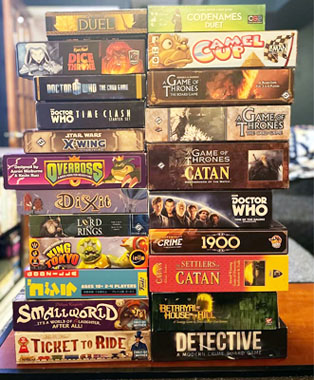 |
- 7 Wonders Duel - $25
- Betrayal At The House On The Hill (2E) - $40
- Camel Up - $30
- Chronicles of Crime: 1900 - $25
- Codenames: Duet - $20
- Decrypto - $20
- Detective: A Modern Crime Board Game - $40
- Dice Throne: S1 Rerolled—Barbarian v. Moon Elf - $25
- Dixit - $35
- Doctor Who: The Card Game - $10
- Doctor Who: Time Clash - $10
- Doctor Who: Time Of The Daleks (1st Ed.) - $40
- Game Of Thrones Board Game (Out Of Print) - $50
- Game Of Thrones Card Game (1E) - $15
- Game Of Thrones Settlers of Catan - $50
- Godzilla: Tokyo Clash - $25
- King of Tokyo - $30
- Lord of the Rings (Out Of Print) - $40
- Monopoly (1985 Edition, Sealed) - $10
- Overboss - $30
- Pandemic - $30
- Settlers Of Catan - $30
- Small World - $40
- Star Wars: X-Wing Force Awakens Core Set - $10
- Ticket To Ride - $30 |
While you will get a lot of your games out there quickly, your post will become lost within 24-48 hours, so you'll have to bump it or delete it and repost. If your games are very well priced (see below about pricing), you'll get a few quick sales, but otherwise it might take a few weeks the rest to sell. Also, you will likely have to agree to meet people for the exchange because few people will want to drive across town for a $15 game. As you sell games, you'll want to update your post with "SOLD" notes.
Like I've said, I've had mediocre success in the Denver metro using this process. Further, if you are looking to sell rare or top dollar stuff, this method will not work for you. So, keep reading for a more robust method.
The first thing you need to do is decide what you are going to sell. I can't help you much on that. I will say, however, if you are selling a game and its expansion(s), I recommend bundling them together as one item. While you could sell them separately, it'll be easier on you if you sold them together. Also, mass market games such as Monopoly and Cards Against Humanity are nearly impossible to give away, much less sell.
After you do this, you need to organize the information you need to actually sell them. Here's what to do:
- Take Pictures - Pictures speak louder than words, especially on social media. I highly recommend taking at least two pictures of each game: 1. The box front/cover 2. The inside of the box showing how the components are stored. Some FB groups require a "time stamp" which is simply a piece of paper with your name and the current date written on it. This reduces the re-use of your pictures later by scammers. This is less of an issue with board games, but trading cards groups (i.e. Star Wars Unlimited TCG Marketplace - Buy/Sell/Trade) will delete your post if the pictures don't include time stamps.
- Basic Info - For each game, you'll need to compile info on it such as its name, the condition, price, expansions included, and other details (see below).
- Sales Pitch Info - Since you are selling your games, you might want to write a sentence of two for each game saying how great it is or how yours contains Kickstarter exclusives or what not.
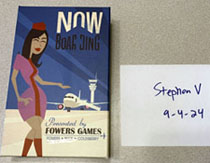
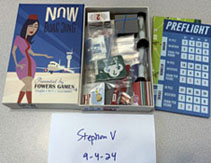
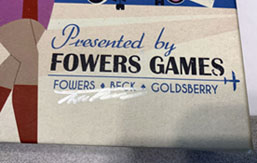
|
Now Boarding - Signed copy - $25
This is a light-weight game with a unique real-time mechanic.
Signed by designer Tim Fowers!
Played twice, so all components and cards are in perfect condition |
There are only two relevant conditions that a board game can be categorized as: New in Shrink and everything else.
- New in Shrink (NIS) - This is pretty cut and dry: these games are unopened and still in their shrink wrap. It is in the condition you'd expect from your local game shop or Amazon.
- Opened, but Unpunched and Never Played - These games have had their shrink wrap removed, but the components are still in their punch boards and likely haven't been even removed from the box. I will still post these games as "new", but clearly caveat them as opened, but unpunched and unplayed. I will usually price them a little less than the NIS price.
- Everything else, including "played once" - The reality is, anything opened and played is a used game even if everything is in perfect condition. If it's not new, then it's used.
- Played once or twice - If you played a game once, maybe twice, and just didn't like it, then this sub-category is for you. The components are probably in perfect (albeit punched) condition. The sad reality is you won't get much in the way of increased value for this statement though. You could probably price a "played once" game a little higher than the standard "used" market price, but be aware you are likely pricing yourself out of a sale if someone just wants a used copy at a good price.
- Used / Played - Everything else falls into this category. If true, adding phrases to your post like "complete", "all part in perfect condition", and "only played a couple of times" will help your post. On the other end, it's important to state things like "one card is bent" or "missing one bit", too.
- Parts Only - If your game is missing components or you have some significant damage to some of them, then you likely won't be able to sell the game beyond a "parts only" post. Someone else with missing or damaged components might buy it to reset their own copy, but don't expect much in the way of value for your game.
Be pragmatic and honest about your game's condition. Double check that the components are all there. If the box has a ding or worn corners, list those facts in your post. The more clear and open you are in your post, the more respectable your post will come across as opposed to someone else's post that is vague. Of course, the condition of your game will have a significant consequence on what you can sell it for. More on determining a price is below.
There are many places to sell your games and your choice will come down to convenience, how fast you want to sell, and how much you want to make. You have to basic choices: selling locally or selling online.
Selling online has one huge advantage over selling locally: you can reach many more potential buyers. However, it also has a huge disadvantage: you have to charge for shipping. A typical board game will cost $12-$18 to ship across the US. And from the buyers perspective, if new copy costs $60 with free shipping and a used copy costs $30 plus $15 for shipping, there's less incentive to buy the used copy.
That said, selling locally has the advantage of no shipping costs meaning buyers are more likely to buy because the overall cost is lower. However, it also has its disadvantages. One, the number of potential buyers is fewer. Two, you will likely have to meet the buyer to make the exchange. The better the prices is, the closer that location can be to your chosen transfer location. Remember to meet in a public place with lots of people. I like to meet in the parking lot of a mall located near the intersection of two major highways.
Also, local buyers have a good chance of flaking. Sometimes they say, "Can you hold it for a few days until I can meet you?" and then I never hear from them again. So, I tell them, "I'll hold it for you if you pay for it now (via Venmo or PayPal)." A good rule of thumb is: if they can meet within 24 hours, I'll let them pay cash when we meet, otherwise they have to prepay.

This is a no-frills selling platform, but it is quite effective. In terms of posting, it is one of the fastest ways to post your games individually because you link your post directly to the game's BGG record. Then you just select a condition and you're basically done (though I always upload a couple pictures of the copy I'm selling, too).
I've had really good luck selling regular games there. Your games won't sell as fast as other places, but the posts remain good indefinitely. Because I've seen posts as old as 10 years that I basically ignore when I'm shopping, I recommend refreshing yours at least once a year. Remember, all things being equal, the newer posts will likely sell first.
I really like how fast it is to create a post as well as the link to the BGG record. It also has a cool price report that easily shows you how your price compares to other posts for the same game. Plus, the seller fee is only 6% which is super low and helps BGG stay a free service.

IMO, one the best places to sell your standard used games is on a local FB group. As I've said, I live in the Denver metro and have sold many games on in the Colorado Board Game Group. The best things about this are you keep all of the sale money (no fees) and you don't have to deal with shipping and its related costs.
However, like I said, you'll have to arrange meetings and local buyers have a propensity to flake on the sale. Sometimes the distance will just be too far and the sale will fall through. Also, selling rare, expensive games this way is very slow as there will be very, very few local buyers looking for those sort of games. So, while you can make good money selling locally, it is a lot of effort.
There are a number of large, location-agnostic board game groups on FB, too. For example, I've had a lot of luck selling Star Wars Unlimited cards in the Star Wars Unlimited TCG Marketplace - Buy/Sell/Trade. There is a lot of risk selling in markets like that, though. There are rarely "feedback" tools for you to determine if someone is legit. You also have the normal shipping headaches and there are few protections if a buyer just says, "I didn't get the game."
If you go this route, follow the group for a while before posting to get a feel for how it operates and what problems you could have selling on it.

This is the granddaddy of online sales platforms. In terms of visibility to buyers, ebay is second to none. People regularly look there first because it's a known platform and very safe to buy from. However, as a seller, it's a lot more work to get your items up there and the fees are very steep. Even if you charge extra for shipping, expect to only pocket about 60% of your sale price after fees and costs. For example, if a new copy is $60 and you sell your used copy for $35, expect to only get about $20 into your account when all is done. Also, as a new seller on the platform, you will have zero feedback and buyers might pass over your items simply because of that.
In terms of used board games, I have found eBay best for rare games such as an original copy of Dark Tower (1981) or Battlestar Galactica (2008) where the prices are in the hundreds of dollars. For those kind of purchases, people are going to want the safety of eBay. For your standard games, there's so many copies for sale there, your price and post is going to have to stand out to attract buyers. I usually target 5%-10% below the average going price.
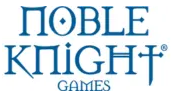
This is an online seller of used games, but they purchase them, too. In fact, they will purchase your entire collection in bulk. However, keep in mind they may not take all games (ex. your huge Cards Against Humanity collection) and, as one would expect, they only pay about 50% of current market value for any given game. That said, they will pay for the shipping of your entire collection to their warehouse.
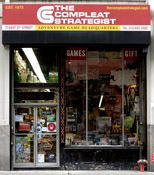
Some local board game shops buy and resell used board games. Like Noble Knights, expect to only pocket 60% or so of the current market value of your games. Others will sell your games on consignment where you can expect a bit more. Both options are an easy way to off load a bunch of games quickly. Call your local shops and ask them if they offer either of these services.
Also, some local gaming conventions (typically the smaller ones) have some sort of swap-meet thing or a flea market. Reach out to the organizers or look in their websites for information. Note, this often requires you to stand by your "booth" selling your games during the con, which might not be what you want to do with your time at one.
This is where it gets real. You are going to make less than you expect or want. I know it's a tough pill to swallow, but if you want to actually sell your games, you'll have to price them appropriately.
For games that are NIS, I usually target 80% of current MSRP as found on Amazon. I know your immediate reaction is, "But it's brand new, why can't I sell it for what it's selling on Amazon?" Well, because Amazon offers free shipping and very easy returns if something wrong. You, as an individual, don't and most buyers (not all, but most) will take the less risky route if the price were the same. For more in-demand games, you could probably get away with 90% that of Amazon, but you risk waiting longer for a sale.
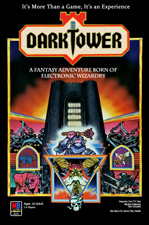
For your standard, run-of-the-mill used game that is opened and in good condition, in my honest opinion, you should target 50% or less of the current MSRP of a brand new copy. If selling for cash locally, then you might be able to get a bit more, but the hard truth is: used games are nearly worthless. And mass marketed games less so.
That said, do a bit of research first. Personally, I check ebay and the Geek Market first to see what copies in the same condition are selling for. Then you will have a reasonable benchmark price to target. If your game comes with a KickStarter promo, list that fact, and you can probably bump up the price a bit. Same with upgraded components. I almost always bundle any expansions with the base game and sell them as a set, so I price the entire set appropriately.
In the end, however, remember that most people will sort by price and look at the cheapest ones first.
The big caveat here is, of course, if you are selling a rare or out-of-print copy of a game. Pricing is going to be a lot different in these cases. Posts on eBay or the Geek Market are where you are going find the approximate current market value. I've sold a copies of Dark Tower (1981) and a NIS copy of Battlestar Galactica (2008) on ebay for several hundred dollars each. And even though I undercut the average price by about 10% just so I would be the better price. Even then, it still took me several weeks to find buyers at those high price points.



For local sales in person, I accept cash and Venmo. PayPal, too, if they want to prepay.
For online sales, I nearly only accept PayPal - Goods & Services (aka PayPal G&S). By using this method, the buyer is covered by the PayPal Purchase Protection. While the G&S takes a fee out of the seller's payment (usually 4%-5%), saying I only accept G&S payments gives me as a seller more legitimacy and frankly, it is the right thing to do. In fact, I believe it is against PayPal's terms for a seller to require the use of the Friends & Family payment option. Sometimes buyers use it anyway and I always make it a point to thank them for saving me a little bit in fees.
Shipping is expensive and a hassle. You'll need a box than you can safely pack your game in. I often keep good-sized boxes I receive for later use instead of immediately recycling them. I also keep the packing material, too, such as bubble wrap or paper wrap. This way I don't have to buy any of that stuff when I'm shipping a used game.
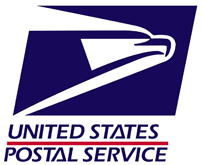
It's important to note that shipping costs are not only based on weight, they are also based on box size. Not only will a heavier package cost more, so will a bigger package. In fact, a huge box of Styrofoam peanuts will cost more to ship than a shoe box full of rocks because of the size penalties. Since some game boxes are so big, you'll need a pretty big box to ship in and those get costly. Remember, the buyer only cares about the total cost (game + shipping), so if that total dollar value is too high, you're going to struggle to sell your game. So consider local for your big-box games.
Regardless of where you sell your game, always use a shipping service the gives you a tracking number. This will protect you from buyers saying they never received the game.
I nearly always use USPS Ground Advantage because I'm shipping within the US. I find they have the best cost for game-sized boxes and there's a post office near me making drop-offs convenient. I have recently started using Pirate Ship because they give me access to USPS Ground Advantage Cubic which is the volume-discounted version of Ground Advantage. As an individual seller, I'd never be able to reach the discounted volume, so using Pirate Ship lowers the shipping costs by a good margin. It also gives a bit of included insurance which covers the value of most of the used games I sell.
Realistically, you're going to have to deal with issues as you sell your games. Sometimes shipments go awry and you have to track them down. Sometimes a component is missing when you though the game was complete. Whether you forgot to put it back in the box before shipping it or you didn't realize something got lost, you'll still have to make it right for the buyer.
I've sold several dozen games of mine over the last few years and I've had issues I need to fix 5 or 6 times. One time I forgot the put the solo components back in the box, so I had to ship them separately at my expense. One time the VAT on a $1200 worth of SWCCG cards was calculated wrong and was actually $300 instead of $50. Granted, it wasn't my fault, but I still comped the guy $50 out of my proceeds to off set the unexpected expense. After all, he bought over a thousand dollars worth of vintage collectable cards.
So, while it's not super common, be prepared for this aspect, too.
Selling your used games is a slog. It takes a lot of time and effort and it still doesn't result in a lot of money in your pocket. You have to decide what is your goal: most value for your games, lowest level of effort, or just freed up shelf space (which feels really good!).
Good luck!